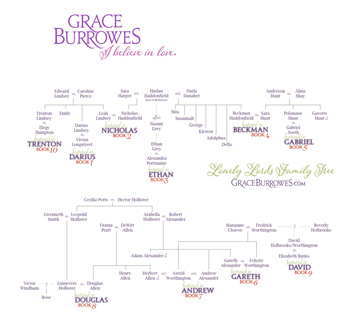David
Lord of Honor
Book 9 in the Lonely Lords series
David Worthington, Viscount Fairly, has inherited a brothel he does not want, but hesitates to sell for fear his employees will not be treated well by the establishment’s next owner. He hires Letty Banks, a courtesan currently without protector, to serve as madam, but soon finds himself attracted to her on more than just a physical level.
When serious harm befalls Letty at David’s brothel, he realizes he cannot continue to ignore the dreams of a woman he cares for. He arranges a way for Letty to return to obscure respectability, and prepares to walk out of her life, only to find he cannot leave her undefended against the trouble bearing down from her past.
Bonus Materials →
Enjoy An Excerpt







Chapter One
Owning a brothel, particularly an elegant, expensive, exclusive brothel, ought to loom as a single, healthy young man’s most dearly treasured fantasy.
Perhaps as fantasies went, the notion had merit. The reality, inherited from a distant cousin, was enough to put David Worthington, fourth Viscount Fairly, into a permanent fit of the dismals.
“Jennings, good morning.” David set his antique Sevres teacup down rather than hurl it against the breakfast parlor’s hearthstones, so annoyed was he to see his man of business at such an hour—again. “I trust you slept well, and I also trust you are about to ruin my breakfast with some bit of bad news.”
Or some barge load of bad news, for Thomas Jennings came around this early, if and only if, he had miserable tidings to share and wanted to gloat in person over their impact.
“My apologies for intruding.” Jennings appropriated a serviette from an empty place setting and swaddled a pilfered pear in spotless linen. “I thought you’d want to know that Musette and Isabella got into a fight with Desdemona and are threatening to open their own business catering to women who enjoy other women.”
Not a spat, a tiff, a disagreement, or an argument, but a fight.
Please, God, may the girls’ aspirations bear fruit. “I fail to see how this involves me.” David paused for a sip of his tea, a fine gunpowder a fellow ought to have the privacy to linger over of a cold and frosty morning. “If the women are enterprising enough to make a go of that dodgy venture, then they have my blessing.”
Though dodgy wasn’t quite fair. London sported several such establishments that David knew of, and each appeared to be thriving.
“Bella told Desdemona you had offered to finance their dodgy venture,” Jennings informed him, taking an audible bite of pear and managing to do so tidily.
“Not likely.” Was there a patron saint for people who owned brothels? A patron devil? “Felicity and Astrid are the best of sisters, but they wouldn’t understand my involvement in that sort of undertaking, and, worse yet, their spouses would find it hilarious. I’ll suggest the ladies apply to you for their financing.”
He shot a toothy smile at Jennings, who’d taken a seat without being invited, a liberty earned through faithful service that dated back well before David’s succession to the Fairly viscountcy.
“I could,” Jennings mused, “but having seen the challenges facing my employer, I will decline that signal honor.” He saluted with his pear.
“Such a fate would be no more than you deserve,” David said, pouring Jennings a cup of hot tea and sliding the cream and sugar toward him. “Those women positively fawn over you.”
Jennings lounged back, long legs crossed at the ankles as he devoured another bite of perfect pear. He managed to look more dangerous than attractive much of the time, but in his unguarded moments, his brown eyes and dark hair could be—and were—called handsome by the ladies. Then too, Thomas Jennings had a well-hidden protective streak roughly equal in breadth to the Pacific Ocean.
Jennings paused halfway around his pear. “Despite your strange eyes, the ladies are unendingly fond of you, too. No accounting for taste, I suppose.”
“Their regard is a dubious blessing, at best. Will you at least accompany me to the scene?” Because the physician in David had to see for himself that matters had been resolved without injury to anything more delicate than feminine pride or the occasional crystal vase.
Jennings rose, pear in hand. “Wouldn’t miss it. I have never been so well entertained as I have since you inherited that damned brothel.”
While David had never been so beleaguered.
When he’d dispatched matters at The Pleasure House—a round of scoldings worthy of any headmaster, followed by teary apologies that would have done first formers proud—he departed from the premises with a sense of escape no adult male ought to feel when leaving an elegant bordello.
As cold as the day was, David still chose to wait with Jennings in the mews behind The Pleasure House for his mare to be brought around. Why David alone could address the myriad petty, consummately annoying conflicts that arose among his employees was a mystery of Delphic proportions.
“I’ve been meaning to mention something,” Jennings said as David’s gray was led into the yard. With a sense of being hounded by doom, David accepted the reins from the stableboy.
“Unburden yourself, then, Thomas. The day grows chilly.” And a large house full of feuding women and valuable breakables sat not fifty feet on the other side of the garden wall.
“Do you recall a Mrs. Letitia Banks?”
“I do,” David replied, slinging his reins over the horse’s head as an image of dark hair, slim grace, and pretty, sad eyes assailed him. What had Letty Banks seen in David’s late brother-in-law that she’d accepted such a buffoon as her protector?
“You sent me to advise her regarding investment of a certain sum upon the death of her last protector,” Jennings went on as a single snowflake drifted onto the toe of David’s left boot. “I did that, and she’s had two quarterly payments of interest on her principle since then.”
David swung up into the saddle, feeling the cold of the seat through his doeskin breeches. “All of which I am sure you handled with your customary discretion.”
Jennings sighed. “I have.”
Perishing saints. Thomas Jennings would scowl, smirk, swear, stomp away, or—on rare occasion—even smile, but he wasn’t prone to sighing.
From his perch on the mare, David studied Thomas, a fellow who, on at least two occasions, had wrought mortal peril on those seeking to harm his employer. “This is a historic day. You are being coy, Thomas.”
Jennings glanced around, making the day doubly historic, for Jennings evidenced uncertainty no more frequently than he appeared coy. “She spends it.”
Coy, uncertain, and indirect was an alarming combination coming from Jennings. “Of course she spends it. She is a female in a particular line of business, and she must maintain appearances. Whether she spends the interest or reinvests it with the principle is no business of mine.”
“She’s not spending it to maintain appearances,” Jennings said. “I believe, despite this income, the lady is in difficulties.”
David masked his astonishment by brushing his horse’s mane to lie uniformly on the right side of her neck. He wasn’t astonished that Letitia Banks was in difficulties—a courtesan’s life was precarious and often drove even strong women to excesses of drink, opium, gambling, and other expensive vices. What astonished him was that Jennings would comment on the matter.
“Thomas, I would acquit you of anything resembling a soft heart”—at least to appearances—“but you are distressed by Mrs. Banks’s circumstances. Whatever are you trying to tell me?”
“I don’t know.” Jennings’s horse was led out, a great, dark brute of a beast, probably chosen to complement its great, dark brute of an owner. “Something about that situation isn’t right, and you should take a look.”
“Might you be less cryptic? If there is looking to be done”—and Mrs. Banks made for a pleasant look, indeed—“then are you not in a better position to do it than I? I’ve met the lady only once.”
Months ago, and under difficult circumstances, and yet, she’d lingered at the back of David’s mind, a pretty ghost he hadn’t attempted to exorcise.
Jennings’s features acquired his signature scowl, which might have explained why the stableboy remained a few paces off with the black gelding. “I haven’t your ability to charm a reluctant female, and my efforts to date meet with a polite, pretty, lusciously scented stone wall.”
Had Jennings noted that the luscious scent was mostly roses?
“You mustn’t glower at the lady when you’re trying to tease her secrets from her, Thomas. You aren’t really as bad-looking as you want everyone to think.”
Jennings took the reins from the groom, and gave the girth a snug pull. “Since coming into that money, she’s let a footman and a groom go, sold a horse, and if I’m not mistaken, parted with some fripperies. She’s reduced to taking a pony cart to market.”
“Thomas,” David said gently, “she is a professional. She would likely accept you as her next protector, and her financial worries would be solved. In her business, these periodic lapses in revenue happen. She’ll manage.”
Though the soft-spoken, demure ones usually managed the worst.
Thomas sighed again, a sigh intended to produce guilt in the one who heard it. “I am asking you to look into her situation.”
Jennings never asked for anything. He collected his generous pay, occasionally disappeared on personal business, and comported himself as a perfect—if occasionally impertinent and moody—man of business. He was both more and less than a friend, and David was attached to him in some way neither man believed merited discussion.
And really, David could not muster a desire to argue with Jennings on this topic, not even for form’s sake.
“I will look into it,” David said, touching the brim of his hat before trotting off to his next destination.
![]()
On this frigid, overcast day, the part of Town where the jewelers’ shops clustered was in want of traffic. David perused the offerings at three different establishments, not seeing anything that appealed for his purpose. At the fourth shop, a less pretentious and ever so slightly musty incarnation of the previous three, he wandered between glass cases of yet more uninspired bracelets, rings, and necklaces, none of which were appropriate to a very young lady.
“She looks lonely to me,” a male voice taunted.
“Lonely?” another man answered. “Or grieving. Does a mistress grieve? Mayhap we should offer her consolation.”
“She grieves the loss of a man’s money,” a third added snidely. “Though look you, my friends, at a woman who is buying herself yet more jewelry when she has no one to give it to her.”
Bullying. David knew the sound of it, from childhood on. While blond hair fit in well enough, and even some extra height might escape comment, a presumed bastard with one blue eye and one green eye was intimately familiar with bullying in all its forms.
And these three young sprigs were merely warming up.
A willowy brunette stood at the shop counter, her back to David, her reticule and gloves on the case before her. She was the object of this gratuitous meanness, though she knew better than to respond. She wasn’t going to fight or flee; she was instead holding her ground.
David made a pretense of looking over the items in the display, hoping his simple presence would deter the young men from further mischief.
“Don’t suppose this place has anything adequate for the likes of her,” the boys started back in. “I heard Lord Amery never denied her anything.”
Amery?
The title landed in David’s awareness with a physical shock, for the rigid spine, plain brown cloak, and beaded reticule across the room belonged to none other than Letitia Banks. That shock smacked unmistakably of the hand of fate, shaking David’s conscience by the scruff of its neck.
He swept up to the lady and possessed himself of her startlingly cold hand.
“Mrs. Banks, I am ever so pleased to see you again.” He bowed correctly over that hand, and treated her to a decorous smile. When he straightened, surprise was receding from her dark eyes, though her gaze was guarded.
And still, to David, sad.
“Viscount Fairly.” She curtsied. “A pleasure.”
She’d withdrawn her hand, suggesting the sight of David would be a wary, cautious pleasure until she knew he wouldn’t join in the taunting.
David aimed a look to his left, at the three lackwits who had gone quiet after a muttered, “That’s Fairly,” had been hissed from one to his companions.
“Hello, Tavistock,” David said with excruciating civility. “Bootley, and—forgive me if the name eludes me—Belchamp, I believe?” He turned away from them with such perfect unconcern that even simians such as they had to understand: their misbehavior had been noted, and any hopes they’d treasured of gaining admission to The Pleasure House had been blown to cinders.
Marking the first occasion in David’s experience when owning a brothel had served a worthy purpose.
“Here you go, ma’am.” A clerk scuttled forth from the faded blue velvet curtain partitioning off the back of the shop and put a small cloth bag into Mrs. Banks’s hand. “A pleasure, as always.”
“My thanks,” she said, sliding the bag into her reticule.
David did not stay her with anything but his respectful manners, though the urge to restrain her with a hand on her arm was tempting. “Perhaps you wouldn’t mind bearing me company for a moment or two longer, Mrs. Banks? I’d like to put a certain matter of fashion before a lady, if you’d tolerate my escort to your next destination?”
“Of course, my lord,” she said in the same soft, controlled voice. “I’ve some gloves to pick up several doors down.”
They walked out in silence, the street nearly deserted. The chill wind had picked up, and the sky had taken on a leaden quality. David signaled to his groom to walk the mare home, and hoped this difficult day wouldn’t include a pair of ruined riding boots.
“Do you suppose it will snow?” David asked, offering his arm.
“My housekeeper says it will,” Mrs. Banks replied, taking his elbow about as firmly as she might grasp, say, the tail of a hungry, sleeping dragon. “Her rheumatism hasn’t been wrong yet.”
David owned a brothel. He approved its expenses, signed contracts for its every pound of flour, head of cabbage, and lump of coal. He knew courtesans’ clothes required laundering, the dishes from which they drank their tea had to be washed, and so forth, and yet, he hadn’t pictured Letitia Banks with a housekeeper, much less one suffering sore joints.
“I really did have something I’d like to discuss with you.”
She stiffened, as if she expected him to proposition her right there on the street, the sky about to dump more cold and misery on all and sundry. Her posture alone communicated that if David were to make such overtures, they’d be unwelcome.
Which was interesting, and not a little lowering.
“Do you truly have a pair of gloves to pick up, Mrs. Banks? Or may I take you somewhere we might have some shelter from the elements?” He had no particular matter to discuss with her, but the wind was bitter, and she’d been out shopping without even a maid to attend her on a day when most people would be snuggled up to a blazing hearth, a steaming pot of tea at hand.
And Thomas had been worried about her.
“The gloves can wait. We could return to my house, if you like.” She ducked her eyes to the left at that offer, suggesting she’d forced herself to make it.
David did not want to return to the modest dwelling where, on the occasion of his brother-in-law’s death, he’d paid a call on her months ago.
“I have a property only a few blocks distant that’s not in use at present. If you’d allow it, I could look in on my staff and get a bite to eat. I’m realizing, as I stand here, that I’ve skipped my luncheon.” For no discernible reason, or possibly to enhance his credibility with a bit of truth, he added, “I become irritable when peckish.”
Particularly when he’d also foregone most of his breakfast for the entertainment of his man of business.
The lady treated him to a considering pause, the duration of three lazy snow flakes, before she let David escort her the several blocks to their destination.
“This is lovely,” she said, looking around the entrance hall of a dwelling David had meant to rent out but hadn’t got around to.
“I have a number of rentals throughout the city, this being one. Let me take your cloak, as it appears I’m short of staff.”
When he raised his hands to undo the frogs at her throat, she flinched, a reaction any brothel owner—much less a fellow trained as a physician—recognized. David dropped his hands and stepped back.
Skittish. Of course she was skittish. They were alone, David had a good five stone of weight on her, and half a foot of height, at least. “My apologies. I did not mean to presume.”
“I’m just…” She fumbled the fastenings free, her hands shaking. “I was surprised, my lord, nothing more.”
He deposited her cloak and his greatcoat on hooks in the hallway and offered her his arm. The notion that she might be anticipating a forcible sampling of her charms flitted through his mind like another of those cold, bone-penetrating gusts of wind.
“We’ll summon reinforcements from below stairs,” David suggested. “And I hope you will join me in some luncheon, though it’s late for that. I won’t last until tea if I don’t eat something.”
She dropped her hand from his arm when they gained the parlor. “You must accommodate yourself, my lord.”
Mrs. Banks wasn’t reassured by small talk—smart woman.
“I’m surprised you remember me,” David said, lighting candles about the room with a taper from the fireplace. “If you give the bellpull a yank, we’ll no doubt break up a rousing game of whist in the servants’ parlor.”
She tugged on the bellpull but did not take a seat. “You provided me funds upon your brother-in-law’s death without asking anything in return. Why shouldn’t I remember you?” She was too polite to mention his mismatched eyes, and she sounded unhappy with him for his generosity.
Or perhaps she was unhappy with herself for accepting it.
David had been unhappy too, because what sum, however great, could compensate a woman for what Amery had taken from her?
A knock on the door, followed by David’s command to enter, admitted a smiling housekeeper.
“Lord Fairly, I thought I heard the front door.” The little dumpling of a housekeeper, apron spotless, cap tidy, beamed at him as if his arrival were her every wish come true. “Staff’s off today, but I am sure you and your guest could use a pot of tea and some victuals.”
“Mrs. Moses.” He smiled right back, a cheerful housekeeper qualifying as one of life’s dearer blessings. “You would live in my dreams forever were you to provide some hot tea and cold food. We are famished.”
Her smile grew brighter. “And will you be needing anything else?”
“I might be needing a room here for tonight, if you don’t mind,” he said, thinking of the pleasures of a London snowstorm and the perfect fit of his riding boots. “Don’t go to any bother. As long as the sheets are clean, I’ll manage.”
“It won’t be any trouble.” Mrs. Moses curtsied and bustled off. She never moved at less than a full parade bustle, and David had never seen her discommoded. When he turned to face Mrs. Banks, he was surprised to see her expression had become discommoded indeed. “Have I given offense?”
“If you intend I share that room, you have.” The weather outside was balmy compared to her tone.
“I do not.” He might speculate, dream, ponder, or fantasize—he was an adult male of means without a current female attachment—but he was not intending anything.
“Then I apologize,” she said, shoulders slumping. “But I am here with you, alone at a private residence, you know of my profession, I am in your debt, and you spoke of… biding here for the night.”
“You don’t know me well enough to understand I wouldn’t presume so,” David said. “Perhaps we might consider your misapprehension a reasonable mistake? Would you like to eat in here, or should we repair to the breakfast parlor?”
“Here. The fire’s already lit.”
And the room boasted two lovely bay windows, one facing the street, which would allow any passersby to note a woman in distress. A viscount—even a viscount—who owned a brothel, eventually appreciated the brutal pragmatism any shopgirl acquired before her twelfth birthday.
“Shall we sit?” He gestured to a sofa upholstered in a blue brocade that went nicely with Mrs. Banks’s coloring. His guest was turning out to be more than a little prickly, and he made the tactical decision not to seat himself beside her.
He fell silent while Mrs. Moses brought lunch and the tea tray on a cart, and then went smiling and beaming on her way, as if David entertained pretty, single women every day of the week—which he did not.
“You are looking at me most oddly, Mrs. Banks, as if you’re surprised to see exactly the meal I’d requested of my housekeeper. Would you be so good as to pour?”
“Of course,” she said, taking off her gloves and reaching for the pot. “How strong do you like your tea?”
“Just short of bitter. And most people stare at me, until they figure out that the problem with my countenance is that I have one blue eye and one green eye. Then they invariably don’t know where to look.”
“But your eyes are beautiful,” Mrs. Banks remonstrated, sitting back without lifting the teapot. As soon as the words left her lips, she looked away, and now—of all things—a blush suffused her cheeks. “I do apologize, my lord, for making such a personal observation.”
A blushing courtesan was not something even the owner of a brothel saw every day, and the sight was… charming, but also somehow discordant. Intriguing in ways that made a man, a gentleman, inconveniently curious.
“One doesn’t apologize for a sincere compliment, Mrs. Banks.” David’s younger sister had paid him a similar compliment once, and Astrid Alexander was a stranger to flattery. “Our tea should be adequately steeped by now.”
“As you wish.” She poured and fixed his tea with cream and sugar, then passed him his cup, her hand still evidencing a minute tremor. The physician in David noted it, as did the man, and neither one was pleased.
“I’ve traveled a great deal,” David said, “but I’ve found nothing anywhere to rival the simple pleasure and comfort of a cup of strong tea. When one is poor, such comforts are dear indeed.”
“You consider yourself impoverished?” Mrs. Banks asked as she prepared her tea.
Before he answered, David paused to close his eyes and take his first sip of strong, sweet, nearly scalding tea, for bliss in any form was to be savored.
“As a child, I lived with my mother in a small town in Scotland. Our circumstances were humble, and the winters long and cold. My mother loved me, and I never understood how poor we were, because it was all I’d known.”
“But your mother understood,” Mrs. Banks guessed—accurately. “May I fix you a plate, my lord?” She might have been the hostess at some village at home, so correct were her manners.
“At least one.” For David grew hungrier by the moment, also more desperate to provide the woman a decent meal.
As she arranged bread, cheddar, ham, and sliced apples on a plate, David discreetly studied his guest. Her dark hair and dark eyes were not pretty, not in the blond, blue-eyed Teutonic sense most Englishmen would be drawn to. She was not charmingly petite, not overtly flirtatious. She was, all in all, an unlikely choice as a courtesan—the best ones were—but even as he drew that conclusion, David had to admit the woman was… restful, like his sister Felicity was restful, even in the presence of her decidedly unrestful spouse.
Letty Banks moved with graceful, economical motions; she was comfortable with silence; she had good instincts.
And Thomas Jennings’s hunch had been accurate: Letty Banks was in serious trouble, too.
![]()
A man seeking to buy a woman’s favors always bore a bit of calculation in his eyes. Sometimes, the calculation was friendly. Sometimes the coin he offered was a promise, a ring, pretty words, soft caresses, or a bit of cash. More often, he didn’t try to disguise his objective or his contempt for a woman who’d grant it.
Letty had become so cold, so hungry, she’d nearly stopped seeing the calculation and the contempt, and yet, in David Worthington’s eyes she found… neither. Not for her, and not for himself.
“Thank you.” He accepted the plate, letting his fingers brush hers, a fleeting warmth any woman of sense would disregard. “And you must join me, Mrs. Banks, else I shall feel like a glutton.”
The tray bore a veritable feast by Letty’s standards, and yet, she was already in his lordship’s debt.
“I insist, Mrs. Banks,” her host said gently. “You will hurt Mrs. Moses’s feelings if you refuse her offering. She’s quite sensitive.”
Letty knew housekeepers, and had she gone ’round to Mrs. Moses’s back door, she would have met with the domestic equivalent of a full-grown, well-fed bulldog, intent on guarding the master’s last bucket of scraps.
“I am hungry.” Famished, halfway to starving, if the fit of her dresses was any indication. One shouldn’t lie, not to others and not to oneself.
Lord Fairly picked up a plate, and as she had for him, arranged a generous portion of ham, cheese, pale bread—crusts sliced off—and crisp apple slices on it. She accepted the food with a silent prayer of gratitude, making sure this time their fingers did not brush. By sheer discipline, Letty did not use both hands to cram the food in her mouth.
“I do not think Mrs. Moses’s feelings could be so hurt she’d hold it against you for long, my lord. Given your charm, she’d sooner apologize for overloading the tray.”
He looked pleased. “You accuse me of charm? My sisters say otherwise. They say I am entirely too dour and withdrawn, and because I don’t go about in Society much, they might have a point.”
Men did not mention their sisters to Letty Banks, though this man apparently did.
“Perhaps you are shy.” She bit into an apple first, an apple that had been carefully stored in a cold cellar, and still had most of its sweet crispness and only a hint of earth about its flavor.
“I’m not shy, exactly.” Though his lordship’s expression came close to bashful. “I enjoy people well enough, or some people, but I also need my solitude.”
Letty made herself pause in her eating, a bite of cheese in hand. “Were you in my profession, you would have plenty of solitude.” She ought not to have said that, but hunger was making her light-headed and more heavy-hearted than usual.
His lordship peered over at her, his sandwich two inches from a mouth that sported the even white teeth of the aristocrat who troubled about his hygiene. When he smiled, those teeth were in evidence, as was a warm benevolence that beamed from his gorgeous eyes and made Letty ache to be worthy of his regard.
His respect, rather.
“I’m sorry,” Letty said, though she didn’t put down her bite of cheese. “That was a vulgar thing to say when you are being so… civil.”
“Not vulgar, honest. I appreciate honesty, and I never considered solitude might be a large part of a courtesan’s life. I have wondered though, if the girls at The Pleasure House don’t remain there in part because having other females…”
He trailed off, looking away toward the side window, though he hadn’t drawn the drapes on either one. The flurries had thickened outside, whirling about on cold gusts and turning the day from gray to grayer.
“I believe,” he said, topping up Letty’s teacup, “I am the one who must now apologize. I should not have mentioned that establishment in your presence.”
Steam curled up from her cup, putting her in mind of the incense that used to be part of the highest church services. “Whyever not? I send you business, you know. And I am a courtesan, of sorts, as you said. While I enjoy the company manners you show me, my lord, I understand that with women of my ilk, they are entirely discretionary.”
She put the cheese on her tongue, savored the salt and tang of good, sharp cheddar, let it warm for a moment, then slowly, slowly chewed a bite of heaven.
Only to find her host’s expression had become quite… severe.
“Mrs. Banks, every female is deserving of decent manners. I insist upon it in my establishment, and it pains me sorely that you would not feel entitled to the same treatment.”
The cheese was so delicious, so devastatingly nourishing to the body and spirit, Letty nearly missed the sense of his lordship’s words.
She rolled up a slice of ham with her fingers, as he’d done. “Feeling entitled to manners and being shown them are two different things. You heard those young gentlemen at the jeweler’s. I pay a price for who and what I am. I accept that.”
One shouldn’t resent a penance, though Letty did. She also ate the ham, which was perfectly seasoned, a bit smoky, a bit sweet. His lordship’s quibbling over the civilities was all very impressive—perhaps his variety of calculation demanded manners—but a good meal was more impressive yet.
He sat back, making the chair creak and reminding Letty, that for all his golden good looks and exquisite tailoring, Lord Fairly was a large, fit man—as the late Lord Amery had been—and he had yet to state his true agenda.
“You shouldn’t accept rudeness, Mrs. Banks. Boys in a pack like that want a whipper-in, lest they run riot. You have piqued my curiosity, however.”
Hunting analogies found their way into all too many discussions of Letty’s profession. She munched her ham and debated between the bread or the apple next.
“You mentioned you send me business,” Fairly said. “In particular, you recently suggested Lord Valentine Windham might find someone suited to his needs at my establishment. He’s a decent man, pleasant enough to look on, clean about his person, and so forth. If you are without a protector, Mrs. Banks, as those nasty boys implied, why not allow him your company?”
The question stunned her, both because itwas more personal than if Fairly had propositioned her himself, and because it implied that a man she’d met on one other occasion months ago had intimate knowledge of her circumstances.
At what point did a woman become notorious?
“Young Windham was rather downcast to be rejected,” he went on, “though I’m sure he was gracious about it. He likes you, you see, and probably would still be interested, were you amenable. And if Windham is unacceptable to you, perhaps my man, Thomas—”
He broke off when she stood quickly enough to provoke more lightheadedness. Letty hadn’t seen this coming, hadn’t realized a brothel owner would know how to procure without even appearing to do so. Her disappointment was sufficiently profound that she had to move away from the food, lest she disgrace herself with the resulting upset.
“There’s the problem, my lord, is it not?”
He rose as well, probably out of blasted good manners, and joined Letty at the bay window overlooking the dormant side garden.
“You have me at a loss,” he said, standing at her shoulder, and heaven defend her, Fairly’s scent was sublime, all spices and sweetness, sandalwood, flowers, and wealth.
“It doesn’t do, your lordship,” Letty said, the cold from the window almost welcome, “to like one’s protector, at least not for me.” And probably not for the women who worked for Lord Fairly, did he but know it.
“You have a novel approach to selecting a partner for your intimate attentions, Mrs. Banks: you bed only men you don’t like? I don’t suppose the late Lord Amery was aware of your criterion.”
His tone had become analytical, perhaps to hide his lordly dismay, for by his lights—his innocent lights, in some regard—whores were no doubt at all times to enjoy their work.
“Our conversation grows too personal.” Though somehow, not rude. Letty ducked around his lordship and returned to her seat on the couch and to the warmth thrown out by the fire. “I’m sure you meant no offense.”
“Of course not,” he said, resuming his seat as well.
He picked up a slice of apple from her plate—his plate was empty—and popped it into his mouth.
“You find this humorous?” she asked a touch sharply. She’d had plans for that apple slice.
“Eat,” he said, his tone suggesting he liked a woman with some temper, the idiot. “If you had used such a severe tone on those puppies at the jeweler’s, they would still be howling their indignation and surprise. Well done, Mrs. Banks.”
He did not like her temper; he approved of it. Letty digested that, along with the rest of her cheese and ham, and a second cup of tea. The food settled, as good food would, and the tea…
The hot, strong, sweet tea made her want to cry. The pot sat swaddled in a thick white towel to keep the heat in, while Letty hadn’t a thick white towel left to sell. Outside, the snow had picked up, and the distance to Letty’s door stretched impossibly far.
The viscount struck Letty as the cuddling sort, and he’d give off heat like a parlor stove. Would it really have been so awful to spend the night tucked up in his embrace, a hot breakfast brought to them tomorrow morning, and a sum of coins jingling in Letty’s pockets when she parted from him?
The thought appalled her for its very wistfulness.
“The hardest thing…” She’d said the words aloud, though she hadn’t meant to. She hoped he’d ignore her queer start, but he only regarded her from one blue eye and one green eye, both of which were beautiful, and… kind.
Those eyes had made him an outcast, had made him comfortable with being an outcast.
Letty broke a slice in bread in half, but couldn’t get it to her mouth fast enough to stop more words from tripping forth. “The hardest thing was when he’d spend inside me. Lord Amery, that is.”
She hared off back to the window, wrapping her arms around her middle against a cold beyond what the weather threatened. His lordship did not understand why a woman needed to hate her protector, and Letty would share that insight with him, regardless he was a stranger and she expected him remain so.
Fairly needed to understand that a woman raised to love her neighbor was slowly filling with hatred, even as her belly went empty, day after day.
“And that hurt you,” he said, standing more closely than on their last trip away from the fire’s warmth. “More than his indifference to your needs of a physical nature.”
The only need she had left of a physical nature was the need to be left alone, or so she hoped.
Letty hadn’t cried in months, not in years. Not when Herbert Allen had died, not when Olivia regularly failed to include even a word about Danny in her infrequent notes.
A hot trickle down her cheek informed her she was crying now.
“The worst hurt,” Fairly went on, “was that he would risk getting a child with you, because that was disregard for the entire remainder of your life, and for the child’s life too. A child you would have been solely responsible for, despite assurances to the contrary. And all so Amery might have a few moments, a few instants, of pleasure.”
He had a beautiful voice to go with his beautiful eyes. He could have offered sermons on damnation and hellfire, and the congregation would have listened raptly, because that voice was kind and knowing. His touch, when he turned her by the shoulders and brought her into his embrace, was kind and knowing too.
Damnably, devastatingly, irresistibly kind.
He drew her against his body slowly, giving her the ongoing chance to flee, or offer him another scold for being too personal, but she stood in the circle of his arms without the strength even to return his embrace.
Chapter Two
Letty Banks was too slender. The physician in David, an aspect of himself he’d often resented, took note of shoulder blades, nape, and wrist bones, all too much in evidence.
The man in him comforted her anyway, pressed her face to his shoulder, and stroked his hands over her back until she leaned against him.
She had apparently needed to cry, because minutes passed with him holding her thus. At no point did she slide her arms around him, but David didn’t need her to. He could feel the heat rising from her body, and with it, a faint fragrance of roses. He’d caught the scent briefly before, when he’d bounced up to her full of flattery and ready to kill her detractors in the jeweler’s shop.
The fragrance teased him now: subtle, feminine, sweet, and enticing.
She was skinny, and he also had the impression that she was exhausted in body and spirit. Something in the way her weight rested against him, something that sought shelter despite her dignity gave away her fatigue.
Her tears quieted, and still he held her.
“Don’t apologize. A lady is entitled to her tears.” He fished a handkerchief from a pocket without letting her go, and handed it to her, knowing she’d want to use it before allowing him to see her face.
Though Desdemona, Musette, or any other woman in David’s employ would exploit a tearstained countenance to make him feel guilty—and do so quite successfully.
“I’m going to fix you another cup of tea,” he said, walking her back to the couch with an arm around her shoulders. “You will drink it. You will also finish the food on your plate, if you please, lest I conclude my company has put you off your appetite.”
A physician learned how to cajole like this—teasing and stern, both.
He took a seat beside her, their hips touching, and kept an arm around her back as he prepared her tea with one hand. He didn’t look at her face all the while, though he wanted to. He wanted to see her eyes, wanted to know that the vacant, hopeless mask of the Covent Garden streetwalker would not gaze back at him.
“You must not be shy with me, Mrs. Banks. I have two sisters, both of whom are breeding—again—and I have many lovely employees of the female persuasion. Women cry, I assure you, and you have more to cry about than most.”
She clutched the warm teacup with both hands, obediently sipping. When she put her tea down, he piled more food on his own plate and held it for her.
“Eat. Every bite, if you please.”
“I am not that hungry,” she said, a spark of dignity returning.
“You will hurt my feelings if you deny me the right to push sustenance at you after having provoked your tears.” This was an understatement. She’d make him crazy if she refused his hospitality after he’d made her cry.
She regarded him dubiously then bit into a chocolate tea cake with raspberry icing, closing her eyes and making David’s mouth abruptly go dry. She was not such a Puritan as she’d have him think—maybe not such a Puritan as she tried to believe herself.
“I really did need a woman’s opinion on a certain personal matter. I wasn’t making that up.” The hell he hadn’t been.
She paused in the consumption of her sweet, very much a lady interrupted at her pleasures. “I beg your pardon?”
“In the jewelry shop,” David clarified. “I needed a woman’s inspiration.”
She eyed him warily as she slowly chewed on her second cake. “Regarding?”
Mrs. Banks was not long on charm—or guile—and what a pleasant change that was. “I must buy a present for a lady about whom I care greatly.”
“A family member?”
“No. She isn’t related to me, though I hold her in very great affection.” Would cheerfully die for her, in fact.
Mrs. Banks brushed at her lap, as if crumbs might have had the temerity to fall there, but he could see she was also grateful for a change in topic.
As was David.
“I trust, my lord, you are not asking me to help you choose a present for your current amour?”
“I don’t have a current amour, Mrs. Banks. I own a brothel, if you will recall.” About which, he was not whining. “What would make a suitable gift for a little girl’s birthday?”
Dark brows flew up, and she stopped fussing imaginary crumbs. He’d surprised his reluctant courtesan, which was more gratifying than it ought to be.
“Tell me about this little girl.”
“Her name is Rose, and to her I am Cousin David, though the family connection is attenuated. She is earnest and shy, loyal, affectionate, and very busy. Her best friend is Mr. Bear, and she has recently become the owner of a stalwart steed named George. She has knighted him, however, so he goes by the sobriquet Sir George.”
“You are serious. This matters to you.” And that impressed her. David’s wealth had not, his charm had not, his steady nerves in the face of female tears had not, his fine tailoring and mismatched eyes had not, but his effort to find a present for Rose had. Mrs. Banks chewed a short nail, eyeing him. “A puppy?”
Why hadn’t he thought of that? “Too obvious, and the girl’s parents might not appreciate the resulting mess.”
“So a kitten is out too, or a caged songbird, though I’ve never approved of caging wild creatures. What does she like to do?”
“She thrives on movement,” David said, and he, too, disapproved of taking wild creatures captive. “The day Rose met her prospective stepfather, he had to fetch her out of a tree sporting a hornet’s nest the size of a melon. Rose loves to be outside, particularly with her mama; she has a terrific imagination, she loves animals, and can draw with uncanny skill.”
“Her first set of watercolors, in a wooden case engraved with her name and the date.”
Far better than the set of grooming tools the girl’s ducal grandpapa was rumored to have had made. David resisted the impulse to kiss Mrs. Banks on both cheeks. “Well done, Mrs. Banks. An excellent suggestion.”
“Books,” she went on, “inscribed by you, books of fairytales about knights and princesses and dragons.”
“Splendid. Even her step-papa will be impressed, and he is her knight in shining armor.” The wretch.
“Gardening tools, because she likes to be out of doors, sized to her hand, inscribed. Some Holland bulbs, though it’s not the proper time of year to plant them.”
“Capital!”
“Her own stationery.”
“You are a genius, Mrs. Banks. My troubles are solved.”
She smiled at him, a true, open, winsome smile such as might send a man off on great quests and keep him warm on cold nights. “Which one will you get her?”
“All of the above, of course.”
“You shouldn’t.”
“Whyever not? I am Cousin David, and I can do no wrong. Besides, she liked me best until she met her step-papa. He stole a march on me by wooing her mama. Sneak-thief tactics, if you ask me.”
His indignation was intended to sustain her smile, though that smile became… muted. Sad, even. “Do you know what your Rose would really like?”
He passed her two more tea cakes. “You must tell me.”
“A friend. You mentioned she has no cousins her own age, and when she’s out and about, it’s with her mother.”
Well, hell. “Her parents took her with them to Sussex not long ago, and there Rose had playmates for the first time in her life. When her mama told me that, I wanted to cry, to think of a five-year-old never having once had a playmate.” Memories of his own childhood had risen up, though he felt no need to expound on that in present company.
“Then you be her friend,” Mrs. Banks said, nibbling a lavender cake with lemon icing. “You take her on a picnic; you take her to Astley’s; you read to her; you take her out on her pony. It isn’t complicated.”
She was more animated on this topic than she’d been about her miseries as a mistress.
“You are… right on the mark, Mrs. Banks. Have you raised children, then?”
He posed the question casually—too casually. The way she dispatched the second tea cake said she was not fooled.
“You might be surprised to know, my lord, once long ago, I myself was a little girl looking forward to her birthdays.”
“Not so long ago,” David corrected her. Her hand had no tremor now, suggesting she’d needed badly to eat.
Mrs. Banks dusted her palms, rose, and stood with her back to the fire screen. “Such a day—it is pretty.” Big, fat, lazy snowflakes drifted down through the late-afternoon gloom.
“Your housekeeper’s rheumatism was correct,” David said from her side. “And this weather looks like it could worsen into something inconvenient. Let me send for a coach and see you home.”
“That won’t be necessary, my lord,” she said, turning and warming her hands over the fire screen. “I need to stretch my legs, and it’s not that far.”
At least a mile, in bitter cold with failing light. She didn’t want to be seen emerging from his town coach, or she didn’t want to tarry with him here while they waited for the vehicle to be brought from his residence.
A man who owned a profitable brothel—and property on three continents—could always order another pair of boots. “I’ll walk you then, and no argument, please.”
“If you insist.”
“I do,” David said, marveling that any female other than his horse on a good day should acquiesce so easily. “I spend much of my time dealing with my employees at The Pleasure House, and it’s like herding cats. Nothing is more fractious than a determined woman, unless it’s seventeen of them coming at you at once. If you’d oblige me, I’d appreciate it.”
He was whining. Only a dozen women worked at his brothel, but the chefs counted for additional aggravation, as did the patrons.
David walked his guest to the front hallway and fetched her cloak from the brass hooks. He settled it about her shoulders then donned his greatcoat, gloves, and hat. He wanted to wrap his gray merino wool scarf around her neck but didn’t dare.
Before he opened the door for Mrs. Banks, he recalled she’d been carrying a reticule, and retrieved it from the side table in the hallway. “Mustn’t forget this.”
“Thank you very much. Shall we be off before the light fades further?”
He offered his arm and matched his steps to hers with the automatic consideration of a gentleman. As they ambled along in the frigid air, his mind was occupied with a puzzle: The beaded reticule he’d handed to her contained the cloth bag from the jeweler’s. The little sack should have held earbobs, a bracelet, a necklace, or perhaps a brooch with a clasp that had needed mending. What David had felt as he’d handled the reticule, however, had been the unmistakable clink of coins, and not all that many coins.
Why was Letitia Banks pawning her jewelry even as she turned down an offer of protection from a perfectly acceptable, attractive, pleasant young gentleman?
![]()
Walking along beside Lord Fairly was a surprisingly painful business, for the handsome, blond viscount was everything Letty had given up.
No… He was everything she’d never had and would never have. Sophisticated, wealthy, good-humored, well mannered, and with a bred-in-the-bone sense of consideration that made her want things she had once dreamed could be hers.
“Penny for them,” he said when he’d escorted Letty halfway home.
“I have enjoyed this visit with you.” Which ought to occasion pleasure rather than an inexplicable melancholy—her belly was full, after all, and she hadn’t had to part with a single petticoat.
And for a few minutes, despite all her determination to the contrary, she’d cried on a man’s shoulder, and been… comforted.
With that thought, Letty slipped on the dusting of snow underfoot, the soles of her boots being worn smooth, though her escort righted her with no effort at all.
“I am almost sure I hear a but coming,” he said, “perhaps of the same variety you inflicted on poor Windham.”
Poor Windham, the handsome, wealthy, talented, musical prodigy of a duke’s son. “I discouraged Lord Valentine out of motives other than spite, my lord.”
“Befriend him,” Fairly urged her. “He’s recently lost a second brother, this one to consumption, the heir having died several years ago on the Peninsula. If your terms are clearly stated, he won’t trespass.”
“I will consider it.” When the English put Napoleon on the throne.
“May I be honest?” Fairly asked, some of the pleasantness leaving his tone.
“Of course.” Though she wished he wouldn’t be. For two hours, his parlor hadn’t been merely bearable, it had been warm. Fairly wasn’t merely polite to her, he was gracious. The food had been plentiful and fresh, and the tea hot and strong. She’d put as much sugar in hers as she liked, not doled herself out a miserly serving and pretended it tasted just as good.
“I am quite frankly puzzled, Mrs. Banks. You appear to have no source of income, and yet you refused Windham. How do you sustain your household, if not by bartering your favors?”
She forced herself to continue walking, to keep to herself how mortifying his inquiry was. Perhaps by literally crying on his shoulder—in his arms, into his monogrammed silk handkerchief—she had granted him permission to presume this far.
“You needn’t answer, of course.” His tone was concerned rather than curious. “But your circumstances worry me.”
“I appreciate the thought, though I am not your worry.” She had lost the right to be anybody’s worry years ago. Lost it in the vicarage rose arbor, within sight of the peacefully moonlit grave stones.
“You appear to be nobody’s worry. Thus I am anxious, because you are a woman without protection, and my extended family had a hand in authoring difficulties for you.”
“How do you reason that?”
“Your last protector was my brother-by-marriage. I have the sense Herbert did not comport himself well with respect to you, and sometimes it isn’t finances needed to redress a wrong.”
True chivalry, rather than pretty manners, empty flattery, or even the lure of coin was a courtesan’s worst, most beguiling enemy.
Letty increased her pace, despite the slick footing, and Fairly kept up—easily. “I had choices, my lord.” How often had Olivia reminded her of that very truth?
“Somehow, Mrs. Banks, I doubt you had choices in any meaningful sense. When the girls leave my employ, my most stern admonition to them is to always have their own money, somewhere, and to keep its existence and whereabouts a complete secret. Even so, I worry. A woman who has placed herself outside the protections of decent Society is always at risk for disrespect and worse.”
For all his kindness, Fairly implied a fallen woman attained that precarious position all by herself, without aid from anybody else. The ire Letty felt at his judgment was pathetically welcome.
“You think I do not know the risk I’ve invited into my life?”
“No, you do not, not the way a streetwalker knows that risk when the pox gets so bad she can’t ply her trade anymore. Not the way my employees know it when they end up with a baby in their belly. Not the way the actresses and opera dancers know it when their looks begin to fade.”
How fierce he had become, and yet, Letty was not afraid of him. “Are you scolding me?”
“I am worrying about you,” he replied, a thread of exasperation in his voice.
“Why?”
“You need someone to worry about you.”
He could not know the pain his well-meant observation caused. “I most assuredly do not.”
Fairly stopped and stared down at her as the snow swirled around them. For all they weren’t the same color, his eyes were beautiful and… compelling. “You pawned your jewelry, you have no current patron, you turn away business, and you ate like you were starving. You are pale and skinny. I apologize profusely, and for the last time, but I noticed these things.”
“I wish you had not.” She wished he had ignored her altogether, and was so glad he hadn’t.
“What is so awful about a simple show of concern?”
“Is that what this is?” She dropped his arm, when what she wanted to do was cling to him. “Or, having ascertained my direction, will you come by Tuesday next and start ogling my bosom, dropping hints, and standing too close to me? Will you begin to pepper our conversation with double meanings and sly, lascivious innuendo as you serve me more and more wine? Will your exquisite manners desert you when your passions rise? And when I refuse your overtures, will you tell me I am a tease, a slut, and undeserving of your worry after all?”
Letty fell silent, trying to recall any other time when she’d lost her composure twice in the same day. A life of sin had not agreed with her, though a life of short rations didn’t have much to recommend it either, for both caused her a sort of weary, hopeless shame.
Her tirade, so completely out of character with the rest of her interactions with Fairly, appeared to leave his lordship stunned, offended, and at a loss. He picked up her gloved hand by the wrist, put it back on his arm, and resumed walking through the thickening snow at a deliberate pace.
While Letty battled back another bout of tears.
“I have never,” he said at length, “given anyone cause to doubt my honor, and I do not intend to start with you. Will you receive me, Tuesday next?”
She didn’t answer, though he was observing the courtesies, when in truth, he could barge into her home at any time and appropriate what she had given others more or less willingly.
“I am not propositioning you, Mrs. Banks. I am asking permission to call on you, nothing more.”
His lovely voice was as cold as the snowflakes melting against Letty’s cheeks.
He would call on her Tuesday next no matter what she said, so Letty remained silent until they’d reached her door. He led her up the steps of her house, onto a covered front porch. The housekeeper had lit a lantern for her, but in the increasingly dense snow, it cast little real light.
“Thank you, my lord,” she managed, though that didn’t seem adequate when her belly was full for the first time in days. “Thank you for bearing me company on my way home and for your conversation.” She sensed he’d be offended if she thanked him for rescuing her in the jeweler’s shop—more offended. “You will call on me next week?”
One way or another, she needed to know what his plans were.
“I will call. Whether you receive me is entirely for you to decide. Good night, Mrs. Banks.” He bowed over her gloved hand, and waited politely while she opened the door and turned to leave him.
“Until next we meet, my lord,” she said, her back mostly to him.
“I beg your pardon?”
“Until Tuesday.” She stepped into the house and closed the door without further comment. Blast the man and his lovely eyes; she was already wondering how much he might pay a woman to tolerate his intimate attentions.
Though that woman would not be her. That woman would never be her again.
![]()
From behind the window of her front parlor, Letty watched Viscount Fairly walk away, his long-legged pace far more brisk than it had been at her side. He gave off a sense of energy and purpose rather than the exuberant high spirits of the young men newly down from university. David Worthington was not a boy, had probably never been a boy. He was in every sense a man, and that made him… tricky.
“Your tea, love.” Fanny Newcomb put the tray on the low table before the settee, then straightened and regarded the falling snow dourly. “Won’t be fit for man nor beast out there before too much longer.”
She was a plump, gray woman, her face lined with the passing years and with concern for her employer. Fanny was also a connection with home, and for that reason alone, Letty would sell off the last bucket of household ashes before she’d let Fanny go.
“You are too good to me,” Letty said, sinking down onto the sofa. Beside the tea lay two fresh, buttery pieces of shortbread—which they could not afford.
“Those boots have to be cold and wet. Best get them off if you’re not to take a chill.” Fanny’s concern was served with a dash of scold, as usual.
“I did well at the jeweler’s. Still, you need not have used new leaves for the tea.” The scent of the tea was marvelous, and steam curled from the spout into the chilly parlor air.
“This is not a night for weak tea,” Fanny said, tugging the curtains closed. “You were gone quite a while, and I was getting that worried about you.”
“I met someone,” Letty admitted, glad for a chance to parse the encounter with a friendly ear.
Fanny gave up trying to drape the curtains so they entirely blocked the fading afternoon light. “Not a female someone,” she concluded with some interest.
“I met him once before.” Letty bent to unlace her boots, knowing the women at Fairly’s establishment had ladies’ maids for such a task—also coal for their parlor grates. “David Worthington, Viscount Fairly. He called on me when Herbert died.”
“Is he related to Herbert?”
“No.” Letty slipped her feet from her boots and tucked her legs under her on the sofa, because the parlor floor was positively frigid. “Not directly. There’s some connection now through the in-laws to the surviving brother, but Fairly was not close to the deceased.”
Thank heavens.
They fell silent as Fanny perched on the edge of an upholstered chair, fixed Letty a cup of tea, and passed it to her. Maybe some fallen women could observe strict propriety with their last and only employee; Letty was not among them.
“Just shy of bitter,” Letty murmured, closing her eyes with the small bliss of it.
“Did this Viscount fellow suggest he’d be interested in further dealings?”
Letty put down her teacup. “Must we discuss that, Fanny? I understand how strained my finances have become, but your wages are up-to-date, there’s food in the larder for your meals, and the thought… I don’t know if I can.”
Worse, she was nearly certain she could not.
“Well, ducks, you have to do something, and sooner rather than later. Needs must. And certain burdens are a woman’s lot whether she’s married or not. There are fellows who can make the business bearable. Find one of ’em, or find another way to pay the bills, lest you spend next winter on a street corner or on your brother’s charity.”
On that mercifully brief summation of the relevant truths, Fanny withdrew.
Letty’s reticule lay next to the tea tray, the beaded bag another small reminder of home, for it had been a gift from Daniel on Letty’s sixteenth birthday.
She picked up the bag, hearing coins clink within—not enough coins, of course. Never enough.
In the cold, dark parlor, Letty ignored the coins, took out Viscount Fairly’s silk handkerchief, and held it to her nose.
![]()
When Tuesday came around, David nearly missed the time for his call on Mrs. Banks. Desdemona and Portia had gone at each other over Portia’s decision to accept carte blanche from young Lord Ridgely. Desdemona had also entertained the man on occasion, and made comments disparaging his skills.
“Hell hath no ability to hurl the breakables,” David observed, “like a pair of women after a few glasses of wine. And all over some young twit’s ability to keep it up.”
Jennings put the bottom half of a porcelain angel on the mantel. “Or over Portia’s ability to snag the twit’s heart, while Des is left behind. That has to hurt.”
David found the angel’s wings under the piano and set them on the mantel among the collected shrapnel. “Yes, but Portia has to tolerate a steady diet of the twit, who doesn’t strike me as any great bargain.” Certainly not worth shattering hundred-year-old Meissen over.
“None of us are great bargains,” Jennings said, surveying the wreckage in the main parlor. “At least not enough to merit this kind of display. Maybe they’re angry as hell on general principles, and so they squabble with each other over the small things.”
“Angry or scared. You’ll have it cleaned up before this evening?”
“Of course, though Des has a black eye, and Portia’s lip is split. We’ll be a little shorthanded.”
Such violence, and in a residence supposedly devoted to pleasure. “Then tell the ladies not to linger above stairs. Fortunately, the weather has turned cold as hell. Maybe that will keep things quieter tonight.”
“Or make everybody want to snuggle up.” Jennings glanced the clock—mercifully unscathed—on the mantel. “You’d better toddle along if you’re to pay a call on Mrs. Banks.”
“Mrs.…?” David was momentarily at a loss, though this appointment had loomed large in his awareness for days. “Mrs. Banks. Merciful saints, I’ll be off then—dock the damages from the offenders’ pay, and tell them I’ll expect written apologies by week’s end.”
“You’re cruel, Fairly. A nasty, heartless, cruel man.”
In fact, the written apologies were not going to be easy, not when some of the women in David’s employ were all but illiterate. He offered them the chance to learn to read, and without exception, they took advantage of it.
Mrs. Banks, he was sure, could read English, French, and Latin—fat lot of good it seemed to be doing her. When he knocked, her door was opened by an older woman in an apron and cap, who apparently couldn’t be bothered to greet visitors with a smile.
David handed her his card, and she disappeared without offering to take his hat, coat, or gloves. He used the time to study what he could see of the house, and had to agree with Jennings that the place seemed subtly less well appointed than it had months ago.
Cobwebs grew in the hallway corners, the rug running down the hallway was long overdue for a sound beating, and the air was so cold in the foyer David could see his breath, suggesting leaving him in his greatcoat was more consideration than rudeness.
“This way, if you please,” the unsmiling woman said. She led David to a small informal parlor at the back of the house. The hearth sported a coal fire, though by no means would David have called it a cheery blaze.
“Mrs. Banks will be down shortly,” David was informed. “Shall I be getting the tea, then?” The accent was Midlands rural, and the tone entirely put-upon.
“Why don’t you wait until Mrs. Banks joins me, and she can decide whether libation is in order? I doubt I’ll be staying long.” Because even a tea tray was a luxury in this household.
David earned the barest indication of a curtsy for that remark, and was left alone in the little room to remove his coat, hat, and gloves unassisted. The last time he’d been here, Mrs. Banks had received company in the front parlor, a roomier, graciously appointed space at the front of the house.
Why was Mrs. Banks seeing him in this oversized broom closet now, and why was she making him wait?
“My lord.” His hostess stepped into the room, carrying a tea service on a lacquered tray. “I would curtsy, but one of us might end up with a scalding, and I am looking forward to my tea.” She smiled at him, a pleasant if not quite gracious greeting.
“Mrs. Banks.” David bowed then took the tray from her. “A pleasure to see you again, particularly bearing the tea tray on a day such as this.”
“The winters since I’ve come to London have been colder than any I can recall as a child. Shall we be seated?”
David was struck again by Letitia Banks’s quiet loveliness. Here in her own home, she was more comfortable than she had been at his unrented town house. Her attire was simple—a brown velvet skirt, white shirtwaist, brown shawl, and wide red sash—but with her coloring, the shade and texture of the velvet were elegant, rather than plain.
He sat at right angles to her perch on the couch, the better to enjoy simply beholding her.
“You must forgive me for using the family parlor,” Mrs. Banks said, passing him a steaming cup of tea. “It is easier to heat, and gets more light. This room also has the advantage of being closer to the kitchen.”
“I had wondered if you weren’t making a comment on my station, though this is cozy, which given the weather, is a mercy.” There. They had discussed the weather quite thoroughly, and avoided the notion that she had secreted him in the back parlor to hide the very fact that he was calling on her. “Have you considered the topics we discussed last week?”
He might have made more small talk, except he’d held this woman in his arms and brushed his thumb over the too-prominent bone in her wrist.
She paused in the middle of fixing her own cup of tea. “My lord?”
“Your finances merit some attention, Mrs. Banks.” Panic might be a better word than attention, there being not a single tea cake on the tray, and the service being arranged to obscure, but not quite hide, chips in the lacquer.
She sat back, cradling the teacup in her palms, likely the better to treasure any source of warmth. “One should always mind one’s finances.”
She sounded as if she were quoting from Proverbs, though her teapot was wrapped in a thin, dingy towel that might once have sported some embroidery, and she looked paler than she had last week. David did not ask his hostess to pour him a second cup.
“I have need of a competent housekeeper for my estates in Kent,” he said. “I own three, and I use only the one. You could have your pick of the other two.” This was a stupid plan—a stupid idea, for David hadn’t planned much of anything about this encounter, except that he’d see Letty Banks again. If she were in Kent, he’d find reasons to drop in on those other estates, reasons to stay there from time to time.
Perhaps remove there entirely, because this reluctant courtesan intrigued him inordinately.
“My thanks, but I cannot remove to Kent, my lord. I have obligations that require I bide in London.”
He could not offer her a domestic post in London, for his family would drop in from time to time, and Letty Banks was likely known to at least his brothers-in-law.
As he considered a niggardly piece of shortbread that could not possibly be fresh, inspiration struck.
“You could instead be madam at The Pleasure House. The place is driving me to Bedlam, and if I don’t do something with it soon, I’m likely to burn it down.” And then, lest he appear desperate, “You could, in the alternative, ensconce yourself as chatelaine at my estate in County Galway, though it is remote as only rural Ireland can be.”
“I cannot remove to Ireland, but why ensconce me anywhere at all?” she asked in a bewildered tone. “You hardly know me.”
He knew her, despite short acquaintance. Knew she’d been saving those last few bites of shortbread, likely for days, in anticipation of his visit, knew were he not with her, she’d be wearing a second shawl for warmth, one that did not go at all with her ensemble. Yet more inspiration came to his rescue, the kind of honest inspiration she might appreciate.
“I have sisters. When our father died, he expected me to provide for them, but there were hostilities with Bonaparte, and I was prevented from returning to England. My sisters faced dire circumstances by the time I reached them, and they could easily have ended up living… as you do. My younger sister was barely out of the schoolroom.”
Rather than comment on a recitation that surprised the man making it, she got up and poked at the fire, though she added no fuel to it, and her efforts sent a sulfurous cloud of coal smoke into the room. “What does a madam do? Specifically.”
Mrs. Banks wasn’t rejecting him out of hand, not yet, though clearly, she wanted to.
“You do not entertain men.” To her, that would be most important. “Not unless you choose to bestow your favors from time to time for your own pleasure. You are a combination hostess, mother hen, gunnery sergeant, and steward. The position is demanding. Mr. Jennings and I, between us, barely keep up with it. You wouldn’t have to live on the premises, but there are private quarters for that purpose if you need them. The nights, particularly on weekends, can be quite late.”
And the mornings early, when the girls were out of sorts and prone to squabbling, which was to say—always.
Mrs. Banks studied a small orange flame flickering above the coals, while the idea of depositing the burden of the damned brothel on her elegant shoulders gained appeal with each moment David considered it. She had the presence for it, the self-possession, the ability to manage unruly boys in perpetual rut and unhappy women.
“Please be more specific, my lord. Do I keep the books, decide who is to spend the evening with whom, choose menus, collect money? What exactly would I do, and for what kind of compensation?”
David badly wanted her to agree to this. He hated—yes, hated—seeing that smirk on Jennings’s face almost every morning, and the headaches it presaged. He hated the way his in-laws teased him, and the way Douglas Allen, the present Viscount Amery, had simply admonished him weeks ago to find a madam, as if women willing and able to manage such a human circus could be found beneath any hedge.
So he schooled himself to apply his strongest negotiating tactics, and let the silence between them grow.
“The compensation, my lord?”
“Mrs. Banks, you have subdued that fire halfway to next spring. I beg you to resume your seat while we converse.”
Get your opponent to give you something small.
She took her seat and unwrapped the teapot, revealing a predictably chipped article of imitation jasperware.
“Thank you,” David said softly, the state of her tea service providing him needed encouragement. “Your duties can be somewhat flexible. If you detest bookkeeping, we can hire you a bookkeeper. If you are indifferent to wines, you may rely on the good offices of my sommelier. If you prefer not to interact directly with the domestics, we can hire you a house steward.”
“Lord Fairly,” she interrupted him through gritted teeth. “What are my duties?”
Something militant in her eye caught his attention, and abruptly, the discussion went from encouraging to… fascinating.
“Are you asking if one of your duties would be… me?”
Chapter Three
At David’s question, Mrs. Banks nodded slowly, up and down once.
What answer did she want to hear?
What answer did he want to give?
Arousal, jolly and warm, coursed through him. Not the usual physical arousal that came from flirting and strutting, but something fresh, something optimistic, like a seasoned hound baying merrily on the scent of a fox new to the neighborhood.
He straightened the crease of his breeches and kept his legs crossed.
“You are a mature, worldly woman who has been without male companionship for some time. Is it so unreasonable to consider I might be worth your attention, should you be so inclined?”
How humbly he posited his intimate availability to her, how cautiously, when he hadn’t made himself available to a woman since… He could not recall when, where, under what circumstances, or—this was not flattering—with whom.
His question left Mrs. Banks looking bewildered rather than insulted or indignant. Too subtle, then? David shot his cuffs and tried again.
“When you yearn for a man’s embrace, when your body aches for intimate gratification,” he said, his voice dropping lower, “could you imagine availing yourself of my company?” For he could imagine providing her that gratification.
“Gratification?”
He might as well have been speaking Hottentot—or perhaps she simply did not fancy him in any degree, and this was how she conveyed her indifference. For that matter, she might not fancy any man—some of his employees were of a Sapphic persuasion, after all.
“As madam, you will manage the women,” he said briskly. “Keep them well dressed, healthy, and in as good spirits as you can. They decide with whom they will pass an evening, or an hour, though you should be on hand to assist if the need arises.”
“Assist? I thought you said I wouldn’t…” She waved a hand in upward circles, as if that were the universal signal for coitus.
“Sometimes, two fellows get to scrapping about whose turn it is to go upstairs with a certain girl. You intervene before feelings are hurt.”
“Intervene?”
The room had developed a puzzled echo to go with the stink of coal smoke. “They can figuratively draw straws. One goes tonight, the other tomorrow night. A second lady can be tactfully suggested, or they can all three go upstairs at the same time. It isn’t complicated.”
It was complicated and tedious and nerve-wracking, and that was before Portia and Desdemona began imbibing, or Musette’s jealousy was aroused.
“I see.” She gestured with the teapot; he shook his head. “And what if three men wanted to share her favors? Would she take all three upstairs at once?”
David shrugged, having run out of cuffs to shoot and creases to straighten. “I’ve seen it done. A woman can accommodate that many men, after all, but it’s damned funny-looking. Rather like crew—the whole thing needs a coxswain calling the stroke.”
The teapot hit the tray with a clank.
“My wages?” Mrs. Banks was changing the subject—also blushing furiously, though discussion of coin was difficult for some people. David tossed out a sum that reflected what it would be worth to him to get out from under the running of this particular business, and out from under Jennings’s infernal smirks.
“I accept.”
“Just like that?” The magnitude of his relief beggared description. “You aren’t going to make me haggle, and toss in this and that additional consideration? You don’t want Sundays off, your own gig, an account at Madame Baptiste’s?”
She folded her arms, in one gesture turning herself into the embodiment of a female who’d made up her mind and would not be trifled with.
“Your establishment is not open for business on Sunday and Monday nights. I still have my own gig and pony, and I am adequately clothed for the present.”
“Let’s see about that,” David said, rising.
Unease flitted through her eyes at this most prosaic request. “I beg your pardon, my lord?”
“I want to have a look at your wardrobe. What you might think is adequate may not be quite up to the mark. The Pleasure House maintains elegant standards, comparable to what you’d expect were you dining in the home of any peer. Your wardrobe must be worthy of your position.”
And he sounded convincing when he delivered that lecture, because for her, he wanted it to be true: she would be well dressed in his employ. Elegantly well dressed, well fed, well compensated, and well protected.
She chewed a nail, flicking a glance at him that said he was daft, which perhaps he was around her—or brilliant.
“This way,” she said, moving toward the door. “You might want your coat.”
He ignored the advice, even as she added a thick red wool shawl to the brown paisley. She led him up to the second floor, the sway of her hips before him taking the worst of the chill from his blood.
“In here.” She opened the door to a room at the back of the house, the one farthest from the noise, dirt, and stink of the street, closest to the heat coming up the stairwell from the kitchen.
There was a bed, of course, a pretty oak piece with a quilted spread of blues and browns, and a frame for bed hangings, though no hangings were in evidence, and the covers did not look nearly thick enough to keep a body warm of a night. The hangings had been sold, no doubt, or cut up for curtains.
The chamber itself was lovely if cold, boasting some light and a sense of comfort and repose. This was precisely the kind of room David would have envisioned for her: graceful, pretty, and unpretentious.
Wholesome, which was both a relief and, on an ungentlemanly level, an annoyance.
Mrs. Banks opened a large wardrobe in a corner of the room, sending the scents of sage and lavender wafting through the gloomy air. “I didn’t entertain him here, if you’re wondering.”
“I beg your pardon?” David stood behind her, the scent of roses blending with the other fragrances drifting from the depths of the wardrobe.
“Herbert. The late Lord Amery.” She kept her back to him as she fingered dresses, shawls, and chemises. “With him, I used the other bedroom, at the front of the house.”
Well, of course. She’d kept part of herself private this way, by separating business and personal spheres. The girls at The Pleasure House did likewise, never bringing customers to their sleeping quarters, never sleeping in the rooms where they entertained. In some secret guideline for fallen women, this was apparently holy writ.
“This is a lovely room.” What else was he to say? “Did you make the quilt?”
“A long time ago.” She smiled faintly over her shoulder, a flirtatious smile, though she likely hadn’t intended it as such. “What do you make of my frocks, my lord?”
He stood directly behind her for a long moment, ostensibly reviewing the contents of her closet, when in fact, he was inhaling the subtle rosy fragrance of her, imagining his lips on her nape, and considering what she’d do if he pulled her derriere back against his thighs—all quite to his own surprise.
He spent the next half hour tossing her dresses onto the bed, suggesting minor refinements on this one, discarding that one, and frowning thoughtfully over another, all the while battling the distraction of inconvenient arousal.
From handling her clothing? From standing near her? Or was he attracted to Letty Banks because she was not even politely interested in him?
And he liked her for that, for not flirting, teasing, and trying to manipulate him through male appendages already quite vulnerable enough without a woman’s grasp secured around them.
“You really do not dress to show yourself to best advantage,” he said, handing her the dresses one by one to hang back up. “Why is that?”
“What would be the point? I looked well enough for Herbert’s purposes wearing only my shift.”
“In the dark?” David asked, wishing the words back as soon as they left his stupid, thoughtless mouth.
“No.” She ran her hand over the bodice of a green velvet carriage dress gone a bit shiny at the seams. “With candles blazing, my lord. Have you any other rude questions?”
Did you ever enjoy it? He knew better than to ask that, knew it was impertinent, personal, and irrelevant. If he asked that, he’d have to slap his own face.
“Some men,” he observed as he passed her the last of the dresses, “enjoy having the candles out. Enjoy having to learn a woman’s contours and preferences by feel and by the music of her sighs and whispers.”
He was such a man, in fact, or he would be with her.
Mrs. Banks closed the wardrobe, turned, and leaned back against it, her posture putting David in mind of a soldier facing a firing squad. “You have said I need not entertain men to earn my wages.”
He wanted to kiss her, to mash her against the wardrobe and make her feel the rebellion against good sense going on behind his falls. At the same time, he resented her for inspiring his arousal, because he spoke of pleasure, and she quoted contract terms.
And he wanted to call Herbert Allen out posthumously, because the man had abused the lady’s sensibilities unpardonably.
She turned her head, the only evasion their cramped quarters permitted. David told himself to step the hell back, but his feet did not listen.
But because he had been a physician, he noticed she was holding her breath, and that small suggestion that he’d become the bully allowed him to move away, closer to the weak light filtering in through the window.
“Your duties are as I’ve stated, Letty Banks, though nothing should preclude you from delighting in the pleasures a woman of the world might seek for her private enjoyment.”
She let her breath out, perhaps because he’d retreated to the chillier space near the window, perhaps because he’d retreated into manners. “Steady income will be enjoyable, I assure you, my lord.”
David held out a hand to her.
She blinked at his outstretched hand, uncomprehending.
“A bargain between business associates is often sealed with a handshake,” he explained with what he hoped was a disarming smile—provided those business associates were male, and reasonably friendly.
Her smile was puzzled, her hand cold, and David trespassed the smallest degree on his good intentions by kissing her knuckles before letting her hand go.
“I’ll have my solicitors write up our agreement and send it to yours,” he said, holding the door for her. “Which firm do you use?”
“I don’t,” she said, following him down the stairs. “I don’t have a solicitor.”
“We’ll remedy that.” Truly, dear Herbert had not valued this woman properly. A mistress might be a commodity, but she ought to be a cherished commodity. “All of the girls who work for me have solicitors.”
She stopped on the last stair, so their heights nearly matched. “They are not girls.”
David wasn’t about to call them whores. Not ever. “What are they, then? My employees?”
“They are ladies,” she said, her hand on the newel post as if she were some monarch with her royal orb. “They are women, at least. They are not girls and haven’t been for some time. And if you do employ girls, then our association is at an end, my lord.”
“I do not employ any female under the age of twenty-one, nor have I ever.” Though David hadn’t realized it until this exchange with Her Majesty of the Non-Matching Shawls. “I assume you’ll be able to start this week?”
She clutched those shawls more tightly. “This week? I can’t begin this week.”
Now, she intended to haggle? He remained one step below her, thinking she’d chosen her moment well.
“I need a madam, and you have accepted the position, at a very generous wage. You said nothing about needing time, Mrs. Banks.”
“I’m asking for one week, and one week only, then I’ll be your madam, and you will own my time, body and soul—five days of the week. My days off will be my days off, or we have no bargain.”
“One week,” he said, not liking the idea at all. “Though you will join me at The Pleasure House this evening at six of the clock.”
“Tonight?” She looked wary. She looked wary frequently, which would have put a lesser man—a less relieved man—out of charity with her. “Whatever for?”
“I want to show you the place, for one thing, and the clients don’t wander in until eight, or seven at the very earliest. The ladies usually come downstairs about half eight. Tonight is the perfect time to look the premises over and acquaint you with the house itself. I’ll fetch you in my coach, and we can dine when you’ve seen the place. Now, shall we retrieve my coat before I freeze to death standing on your stair?”
“Of course.” She followed him back to the less frigid, more odoriferous parlor, though David had the sense she was profoundly preoccupied.
Well, so was he.
What manner of courtesan was indifferent to the thought of a new wardrobe, had no use for intimate pleasures, and blushed when discussing money? He left the premises uneasy with himself, because perhaps that kind of courtesan—the shy, proper, complicated kind—would really have done better as a housekeeper in County Galway.
![]()
Vicars did not allow whores around their children or their decent womenfolk.
Vicars did not bring fallen women into their family establishments.
Nonetheless, Letty braved the bitter cold; the stinking, crowded, public coach; and the journey that took much longer than it should, and finally, finally, found herself knocking on the door of the vicarage in Little Weldon.
“Letty!” Olivia greeted her with surprise rather than joy, but she opened the door nonetheless, as she’d promised she always would. “Come in, come in. We must not let in the cold.”
“Aunt Letty!” Five-year-old Danny chorused from Olivia’s side. “Aunt Letty has come to visit! Papa!” Danny tore off to deliver the news to his father rather than hug his aunt, while Olivia hustled Letty into the house.
“We weren’t expecting you, Letty,” Olivia remarked as she took Letty’s cloak, bonnet, scarf, and gloves. “Is everything all right?”
The question held worry, as did Olivia’s blue eyes, but it wasn’t worry for Letty.
“Everything is fine. I have a new position, and for the present, at least, my situation is settled. I would have written, Olivia, but I left London on short notice, and I can stay only a few days.”
Letty would not volunteer more than that about her changed circumstances, and Olivia would not ask. Their system was simple, and for years now, it had suited them both.
“You are always welcome.” Olivia’s expression contradicted the plain meaning of the words, but further remarks were forestalled by the arrival of Letty’s brother.
“Letty!” Daniel enveloped his sister in a tight embrace, and Letty’s composure abruptly faltered. Nearly ten years her senior, Daniel Banks had always been her hero. He’d taken the brunt of their father’s sour temper, tolerated Letty’s ceaseless tagging along, and when she’d really, really needed it, he’d taken on her burdens without reproaching her. She clung to him for a long moment, then let him step back to inspect her.
Daniel was tall, brown-haired, brown-eyed, broad-shouldered, and too handsome to be a man of the cloth.
Also, too kind to be anything else.
“You are too thin,” Daniel pronounced. “But a most, most welcome sight.” Unlike his prim, blond wife, Daniel’s sentiments were sincere. “How long can you stay?”
“The rest of the week, only. I’ve started a new position, and I demanded some time away before taking up my duties.” The lies had been easy when offered to Olivia; they nearly choked Letty when given to her brother.
Daniel smiled at his wife. “Let’s have some sustenance in the family parlor, if you please, Olivia. I must hear what my sister has been up to in old Londontowne, and I’m sure you will want to hear as well.”
“Of course, Daniel.” Olivia disappeared into the back of the house, obedient as always.
Daniel’s expression lost its genial good cheer in Olivia’s absence. “She doesn’t mean to be so unwelcoming.”
The irony of Daniel’s pronouncement was profound, and yet he was oblivious to it—thank God.
“Olivia is perfectly civil, and I don’t know when I’ll be able to break free again, so I’ve come to spend what time I can with family.”
“And Danny and I are pleased to see you, as always.” He took her arm and led her into the parlor, seating himself beside her on the sofa. “You really do look too thin, Letty.”
She was famished, and yet more aware that Olivia had shooed young Danny right back upstairs than she was of her hunger.
“I am too thin. I’ve been worried since losing my last post, but things are looking up now.” She’d been raised in this house, raised to be truthful, no matter the cost.
“Tell me about the new position.”
Letty fabricated a tale, of course, about being housekeeper to one of Viscount Fairly’s less used town residences. She hated deceiving her brother, for he’d shown her nothing but kindness and understanding, but she couldn’t disappoint him with the truth. He’d insist on her joining his household, which, for many, many reasons, would never do at all.
So she embroidered on the truth, avoided her brother’s eyes, and listened for any sound indicating Danny might be rejoining them.
![]()
“You are dithering, my lord.”
With three words, Thomas Jennings could jeopardize his own existence, or at least his livelihood.
“I am choosing bed hangings,” David shot back. “In case it has escaped your notice, it’s bloody winter, and a woman needs proper bed hangings if she’s not to fall prey to lung fever. How to choose bed hangings was not on the curriculum at St. Andrews.”
Though why David was subjecting himself to this torment was simple: he wanted Letty Banks to sleep right here at The Pleasure House where he knew she’d be warm and well fed, not at that dusty, stinky, frigid little property she shared with her besom of a housekeeper.
Jennings wrinkled a not insubstantial nose and planted himself on a dressing stool upholstered with cabbage roses. “The burgundy, then.”
David held up the swatch of burgundy velvet, which would make Letty Banks look pale, but then, so would the blue and the green. “Why?”
Jennings found something fascinating to study in the vicinity of his boots. “Won’t show the dirt or the dust.”
“Excellent notion.” David tossed the burgundy velvet at him. “Have we had this flue cleaned recently?”
“Yes.”
Thomas was pouting—or brooding. “When?”
“The first of the year, the same as we have all the chimneys cleaned on this property. There are other ways to keep a woman warm at night besides spending a fortune on velvet nobody will ever see.”
David snatched the fabric from him and folded it into a tidy square. “You won’t be keeping Mrs. Banks warm, Thomas.”
Though he’d be keeping her safe, of course. Jennings was constitutionally incapable of allowing a woman to put her safety at risk, and the employees of The Pleasure House seemed to sense this about him.
“I own I am puzzled.” Jennings rose from his dressing stool, the thing creaking as if in relief.
“You are not puzzled,” David said, folding up the blue velvet, which he’d nearly chosen because it was a regal color, and he’d thought Letty—Mrs. Banks—might prefer it. “You are baiting your employer, who is not in the mood to be trifled with.”
“I think you rather are,” Jennings replied, running a blunt finger over the mantel and inspecting it for dust. “I think a good trifling might improve your disposition considerably.”
David left off folding the length of green velvet. The piece was clearly a cast off, asymmetric, the color washed out across one corner. “What is that supposed to mean?”
Jennings used the broom from the hearth set to brush a stray bit of ash back into the fireplace. “A week ago, you suggested I offer Mrs. Banks carte blanche, now you’re telling me to keep my hands off of her.”
David was not in the least fooled by Jennings’s impersonation of a chambermaid. A question was being asked, one David could answer clearly.
“Thomas,” he said gently, “I am, somewhat to my own surprise, saying that very thing. You, the patrons, that trio of expensive flirts in the kitchen, the boot boy—you will all keep your hands off Mrs. Banks.”
Jennings set the broom back where it belonged. “Leaving only one matter undecided.”
They’d spent much of the afternoon choosing bed hangings, having the footmen replace the area rugs, the curtains and the pillows, and having a chaise brought down from the attics. All in all, the formerly unused bedroom behind the kitchens of The Pleasure House was looking quite lovely.
Though it needed sachets hung on the bedposts and window sashes. Lavender was always pleasant, and rose could be very nice, too.
“And that undecided matter would be?” David asked, because Jennings was smirking again.
“Whether you’ll be getting your hands on the lady.”
David said nothing, for the answer to that question wasn’t his to give.
![]()
“Tell me,” Letty said, a shade too brightly, “did the Doncaster sisters ever make good on their threat to move to Bristol to be with their niece?”
Daniel looked ready to launch gamely into that riveting topic, when Danny came hurtling into the room. “I want Aunt Letty to come see my pony!”
Letty smiled at the child’s enthusiasm. “I didn’t know you had a pony, Danny.”
“It’s not real. It’s a rocking horse, so I can practice.”
“Does your rocking horse have a name?” Letty asked, heart constricting at the earnestness in the child’s expression.
“No, Aunt Letty. It isn’t a real horse. It’s a practice horse, like a toy.”
“Don’t be encouraging flights of imagination in the child,” Olivia chided from her seat nearest the fire. “You would have him name the rocking horse as if it were a doll. And, Danny, you have interrupted your elders.”
Letty stood and held out her hand to Danny. “Even if it has no name, I should like to see it. Danny?”
And Danny’s parents let her go, which made every moment on the coach, and all of Olivia’s disapproving glances of no moment. Letty admired his horse, read stories to him, asked him endless patient questions about his studies, his friends, his hopes and dreams. Thrilled with the attention from his favorite—and only—aunt, Danny chattered on and on and on, until Daniel fetched Letty for dinner.
“Are there children in Fairly’s household?” Daniel asked as he escorted her down the steps.
“He isn’t married.” Letty paused on a small landing to study a sketch she’d done of Danny as an infant, because this was not a discussion to be held within earshot of Olivia.
“How old is this Lord Fairly?”
“Probably about your age.” Or five years Daniel’s junior.
“I’m nearly three and thirty, Letty,” Daniel reminded her, “and I would not, under any circumstances, condone having an unmarried housekeeper eight years my junior, not even in residences I barely use. This is not what I would wish for you.”
That disappointed tone was as close as Daniel would come to censuring her, and his words stung. How much more deeply would Letty be wounded were he to learn the truth?
“He’s a very busy fellow, Daniel,” Letty assured him. “I won’t see much of him, and as soon as he does take a wife, she’ll want to hire her own staff. This will do for now, and it will be a good reference when I leave. Things in London are not so staid as they are out here.”
They were more staid, in some regards, and so much less in others.
Daniel reached past her to straighten up the little sketch, which had hung slightly askew. “What you mean to say is, we are old-fashioned to a fault, which is the truth.”
Letty allowed him to precede her down the steps, though she had a small scold of her own to fire off. “You don’t fool me, Daniel,” she said softly as they approached the dining parlor. “You aren’t happy.”
He had the grace not to contradict her directly, but his gaze slid away, and for a moment his handsome features looked… bleak.
Oh, Daniel, not you too. Please don’t tell me you have made a bed you dread to lie in as well.
“I am not unhappy,” Daniel said, his smile reappearing, though tinged with regret. “I am useful here, and the living is adequate. Olivia, though, is not—”
His words were cut off when the parlor door swung open and the maid of all work backed toward them, wheeling the kitchen trolley.
“Steady there, Nan.” Daniel stopped the girl from bumping into him with a hand on her elbow.
Nan turned, smiling and blushing. “Your pardon, Vicar. Didn’t know you was out there.”
“No harm done.” Daniel stepped back to allow the maid to pass, and Letty couldn’t help but see the glance Nan shot her employer. The young woman admired her vicar, and just as clearly, Daniel ignored the situation.
Olivia was lighting candles on the sideboard in the dining parlor, the fireplace shedding additional light and making the room cozy.
“Shall we sit?” Olivia suggested. “This time of year, it’s almost impossible to get food to the table hot, and cold soup has little appeal.”
Daniel obliged by holding a chair first for his wife and then for his sister. He sat between them at the head of the small table and held out a hand to each of them.
“I’ll keep the blessing short then, so as not to offend the dignity of the soup,” he said with a smile.
He held each woman’s hand while he said a few words. Had Danny been present and not consigned to a tray in the kitchen with Nan, the child would have completed a circle of hands held during the blessing. It was a lovely tradition, one of many Daniel had instituted in contravention of the rituals he and Letty had been raised with.
In his own quiet, smiling way, Daniel Banks was a fighter.
Letty gave her attention to her soup, finding it was in fact wonderfully hot and delicious. “Have you a recipe for this soup, Olivia? I can’t remember when I’ve had better.”
“No recipe. I use whatever is to hand, and we make do.”
“It is good,” Daniel added, patting his wife’s arm. “You are a genius in the kitchen, Olivia. Your table makes me the envy of many men.”
“Needs must,” Olivia rejoined evenly.
Letty restrained herself from rolling her eyes, but felt the barb just the same. Needs must when one couldn’t afford a cook, when one couldn’t afford but one maid, when one couldn’t afford a real pony for one’s only child…
Olivia would be like this until Letty got back on that vile, bouncing coach. Veiled hints that finances were inadequate, pious little asides suggesting Daniel wasn’t a competent provider. Olivia would do no overt complaining, no blaming, no railing against an unjust God. She’d instead keep up ceaseless sniping and implying.
Daniel was either a saint, or so overcome by some misplaced guilt, that he’d put up with whatever snide innuendo Olivia served with each course.
Four days later, Letty was in some part relieved to find herself standing beside Daniel at the local crossroads, waiting for the horn blast to signal the approaching coach.
“Thank you for making this journey, Letty,” Daniel said, peering down at her. “The weather is too cold by half, and the roads have to be awful. But seeing you has done me and Danny good.”
“And I’ve loved seeing you, too.”
He wrapped his arms around her and simply held her as they waited in the bitter breeze. She let her forehead drop to his chest, wishing for the thousandth time that she had the strength to confide in him. Her brother had never once judged her, never found fault with her, never offered her anything but loving kindness.
She couldn’t risk telling him the truth, no matter how badly she feared what was to come, no matter how much she despised her choice of livelihood.
“Your chariot approaches,” Daniel said, stepping back at a distant blast of the coaching horn. “I love you.”
Those were the words of a brave man, because from Daniel Banks they were honest and true.
“And I love you,” Letty said, stretching up to kiss his cold cheek. She felt tears threaten when Daniel caught her up again in a fierce hug and then handed her into the coach. The horses were thundering on their way back to London before she even had her handkerchief out.
![]()
“You are back!” Lord Fairly spotted Letty as she came in the side entrance of The Pleasure House, his demeanor exactly that of a barn cat spying a limping mouse.
And wretched mouse that she was, Letty was glad to see him too. Glad he wasn’t going to leave her to fend for herself on her first night as a madam, glad his smile was so genuine and pleased.
“According to your missive, I am to start my duties this evening,” Letty said, noting not for the first time how quickly his lordship could move, like one of those hawks plummeting from a great height with unerring accuracy.
“That you are.” He took her arm and paused in his forward progress long enough to kiss her cheek. “You have the most delightful scent,” he observed as if to himself, and then he was off again, leading Letty toward the back of the house. “First, I must introduce you to the kitchen staff. I know they’re busy, but it can’t be helped, and this way, Etienne, Pietro, and Manuel will keep their flattery to a minimum.”
She wore plain rosewater, and yet his lordship had noticed.
He spun her toward the kitchens, making Letty feel as if she were in the grip of a polite, charming human tornado—one scented with sandalwood and sporting a smile that ought to be banned by royal decree. The tornado brought her to a halt next to a swarthy, portly man shouting in Italian.
Fairly said something quietly in the same language.
Did Lord Fairly speak Italian in bed? French? Or was he silent, the better to hear a woman’s sighs and whispers?
And where were these extraordinary, useless thoughts coming from?
As Pietro turned to her, his ferocious scowl melted into a smile. “Lord Fairly, and a charming lady, in my kitchen. This will only distract the help, but it cheers me, bella donna, to feast my eyes upon you.”
“Mrs. Banks, may I make known to you Pietro Giancarlo Bertoldi Timotheus Verducci. Pietro, Mrs. Letitia Banks, who will be managing this house for me henceforth. You are to obey her in all things outside the kitchen, if you please.”
Fairly smiled, though his words held a hint of steel. He’d introduced Letty to his fancy chef properly, too, indicating by sheer force of personality that Letty was to be treated respectfully.
Pietro lifted spaniel brown eyes to her and kissed her knuckles. “Though there is no universe outside the kitchen worth mentioning, I will obey you, Mrs. Banks, as directed.”
“He lies,” said a whimsical voice from the other side of the long counter. “That one is not to be trusted. He skimps on the butter, you know.”
“Mrs. Banks,” Fairly began again, turning to a slim, handsome Gallic fellow sporting a hint of gray at his temples. “May I make known to you Etienne Charbourg de Vancourier; Etienne, the new mistress of this house, and your superior outside culinary matters.”
“Madame.” Etienne bowed over her hand and offered her a suave smile. “Do not trust the Italian, but do not even think of turning your back on the Spaniard. He flirts.”
“At least,” said the gentleman in question, “I flirt only with women. Madame, Manuel Cesar de Villanueva y Portemos at your service. Enchanted.” He bowed over her hand with utmost gallantry, but came up yelling in several languages when a resounding crash from the back of the room brought all activity to a hushed halt.
“Excuse us,” Fairly murmured, pulling Letty by the hand from the kitchens. He tugged her down a short corridor into the office, closing the door firmly behind them as if they’d narrowly escaped capture by highwaymen.
“I avoid the kitchens at the start of the evening. The staff is quite busy, and I know next to nothing about what goes on, other than Etienne and Musette have undertaken a flirtation. How was your trip?”
Three Continental chefs at his beck and call, and his lordship looked beleaguered. Though how did Fairly know she’d left London? “My trip?”
He led her to a beautiful Louis Quinze escritoire and sat her down behind it. “I assume you needed several days before starting this position, because you had matters to attend to outside of Town. Anything local you could have managed during the weekly hiatus in your employment.”
Hiatus—a gap, a pause, a break to the common man. Lord Fairly spoke like a vicar. He wasn’t being superior, merely using that all-too-quick brain of his to deduce things about Letty that were none of his business. He’d been the same way on their tour of the facility, showing her a supply of jade phalluses, a room sporting an entire wall of whips, riding crops, manacles, and blindfolds, and another room decorated to look like some sultan’s tent—all with a sense of brisk, clinical disinterest.
Which had fascinated and appalled her as much as the premises themselves.
“So who are your people, Mrs. Banks?” he asked, taking the seat facing the desk.
“What business is that of yours?” And why had he seated her behind the desk and himself before it?
“Interesting word choice—business. I keep a record of next of kin for my employees. Most of them are recently moved to Town in search of employment. They hail from all over, and sometimes I can make an educated guess, based on accent, mannerisms, and so forth, but it’s much easier simply to ask.”
“Why would you want to know?” And when had he ordered the calling cards stacked neatly on one corner of the blotter? They bore Letty’s name and the direction of the house in a tidy, flowing script, as if she were some baronet’s daughter, not a newly minted madam.
That he’d have cards printed was both considerate and… wrong, for she’d have no opportunity to use them.
“When one is in strange surroundings,” his lordship said with peculiar gentleness, “it can make a difference that someone else knows how to locate one’s next of kin—in case of physical injury, death, difficulties, illness, that sort of thing. It’s all too easy to die alone when one is far from home, Mrs. Banks.”
He said this as if the opportunity had nearly befallen him, as if he knew what desperate thoughts a young woman alone and far from home might entertain in her worst moments.
“I should hope not to be doing any dying while here in London, sir, and if I do, I will hardly be concerned for my next of kin.”
She’d be desperately concerned for them, of course. Would his lordship’s family be similarly concerned for him?
“So you do have family. You might as well tell me who they are, Letty.”
He could seduce with that teasing, confiding tone of voice alone. “Mrs. Banks, if you please.”
“Sometimes I do please, sometimes I don’t,” he replied, rising. “Come, I’ll introduce you around tonight and stay close to you. The dress will do, but tomorrow we are sending you to Madame Baptiste’s. Spring is coming—one desperately hopes—and your wardrobe must be adequate to the challenge.”
He held out a hand to her, and Letty found herself taking it.
“You like to hold hands,” she observed as he once again led her through the kitchens and up toward the front of the house. He’d pretty much dragged her by the wrist through the whole building on her last visit. She’d enjoyed the simple contact, enjoyed that at no time had Fairly intimated that he’d wanted to put the premises to their commercial use with Letty.
Heaven defend her, on some level she felt safe with this man.
“I like to hold hands with you,” he replied, smiling over his shoulder. “In part, I like to see you get that puzzled, bothered look you’re wearing now.”
Letty couldn’t help but smile at him, a smile that appreciated the impossibility of such a big, elegant man indulging in impishness. He stopped in the middle of a deserted hallway, his hand still in hers.
“She smiles,” he said as if to himself. “She truly, truly smiles.”
He smiled too, not the dazzling, exuberant smile, something far more personal and equally devastating.
“What’s the other part, your lordship?”
“Beg pardon?”
“What’s the other part? You said you hold hands with me in part to see me get that puzzled, bothered look. What’s the other part?”
“The other part, Letty-love, is that I want you accustmoned to my touch.”
Years ago, she might have chided him for his impertinence—she was not his Letty-love—except he was her employer, and given the venue, endearments and hand-holding were more civilities than offenses.
Then too, nobody had ever called her Letty-love, much less in such wistful tones, and she rather liked holding his hand too.
“Why should you want me accustomed to your touch?” she asked, glancing down at their laced fingers.
His smile faded, which was fortunate for a lady’s composure. “Once we walk through that door, I want it understood by all that you are under my protection, and rather than hanging a sign around your neck, or calling out the first fellow to trespass, I will instead touch you. For the display to be convincing, you should look as if you’re enjoying my attentions, hmm?”
He was logical. How did a logical man go about his seductions, and what was wrong with her, that she liked the notion he’d defend her honor if a patron of the establishment took uninvited liberties with her person?
“You want me to hang all over you?”
“Must you sound so appalled?” His smile was back: lovely, warm, and genuinely amused at her. “Nothing so vulgar as that, but let’s practice a bit, shall we?”
She had no warning, not even a moment to prepare herself, before he stepped in closer and grazed his nose along her cheekbone. He stood, his head bent to her cheek, holding her hand and giving Letty a moment to wish they’d met under any other circumstances.
A courtesan, a whore, would pretend she enjoyed such attentions. How much worse was it that Letty enjoyed them in truth? Enjoyed his lordship’s scent, his strength, his sense of energy and competence, and most of all, his sense of self-restraint.
“Relax,” he murmured. “I’ll behave, Letty-love, but you have to meet me halfway.”
If she permitted him these liberties, she would be safe from the pawing and pinching of other men. And from him, affection would mean nothing, merely a courtesy extended her to allow her bodily privacy from other customers.
And yet, her heart sped up, and not with dread.
He’d introduced his staff to her with punctilious courtesy. He’d had cards printed for her that she’d never use. He’d given thought to how to safeguard Letty from uninvited advances, and he wanted to know she had people to worry for her, should illness strike.
Any woman would be attracted to Lord Fairly’s charm, his good looks, his élan.
As Letty stood close enough to him that his breath fanned over her cheek, she forgave herself for the frisson of arousal his proximity caused. What alarmed her was that she respected this man, and—truly, she must master this lapse—she liked him, too.
“I’m about to kiss you, Letty,” he whispered. “You will allow it?”
Her liking rose toward something more dangerous yet, because when—when—had any man ever asked for her permission before her kissed her?
She nodded but couldn’t bring herself to turn her face up to his. She wasn’t expecting it when his lips feathered against her brow, then her cheek, then the side of her neck. He nuzzled and sighed and took his time, following the contours of her face with his lips and his nose and his breath.
Just as the disappointing thought formed—So, he isn’t going to kiss my mouth.—Fairly’s lips settled gossamer light on hers, as if he rested his mouth on hers, waiting for her to take the initiative. When she didn’t pull away or poker up—the two options she could have envisioned pursuing—the tip of Fairly’s tongue teased along her lips. He’d used a soft, warm, flirting touch, playful and knowing. Letty opened her mouth to ask him what he was doing, but found to her shock his tongue insinuated itself into her mouth.
Heaven defend her. Her employer took lazy, decadent liberties with his tongue. He tasted; he explored; he seemed to grow taller as Letty clung to him. Her head was thrown back, their mouths fused, and her arms had somehow—she honestly knew not how—wound themselves around his neck, her fingers linked under the queue of blond hair gathered at his nape.
He eased away from the kiss, keeping his arms around her. Her wobbly knees appreciated that consideration, even as the rest of her wanted to step back, smooth down her skirts, and coolly precede his lordship into the front parlors—provided she could find them.
Who was she, that she’d thrust her tongue into a man’s mouth? That she’d cling to him so shamelessly? That she’d want him to kiss her and kiss her and kiss her, endlessly?
And why had Herbert never kissed her thus? Why had he never held her hand?
“On second thought,” Fairly said, his forehead resting against hers, “a sign hung ’round your neck might be the safer option all around. You practice very convincingly, Letty Banks.”
A real courtesan, a woman who understood the profession and accepted it for what it was, would have had something clever to say. Letty was not such a woman, and hoped she never would be. “I thought we were kissing.”
“My mistake, for we surely were kissing after all.” He bussed her nose, took half a pace back, and reached for her hand. Letty was glad he did, for she still needed some kind of support if she was to remain upright and yet move.
“Ready to face the lions?” he asked, opening the door and tucking her hand around his elbow.
“As ready as I’ll ever be.” Which was to say, not ready at all.
End of Excerpt
David is available in the following formats:
- Grace’s BookstoreThis is Grace’s
independent
ebook store.
Your purchase can be added to any device. - Barnes & Noble Nook
- Kobo
- Apple Books
- Amazon Kindle
eBook:
Other eBook Purchase Options:
- Kobo UK
- Booktopia AUS
- Amazon Kindle UK
United Kingdom:
Connected Books
David is Book 9 in the Lonely Lords series. The full series reading order is as follows:
- Book 1: Darius
- Book 2: Nicholas
- Book 3: Ethan
- Book 4: Beckman
- Book 5: Gabriel
- Book 6: Gareth
- Book 7: Andrew
- Book 8: Douglas
- Book 9: David
- Book 10: Trenton
- Book 11: Worth
- Book 12: Hadrian
- Book 13: Ashton
- Book 14: The Duke’s Disaster
- Bundle: The Loneliest Lords






























